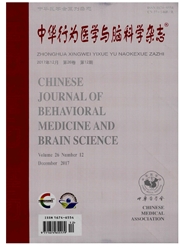

 中文摘要:
中文摘要:
目的 探讨精神分裂症患者反馈学习能力受损的具体模式.方法 采用概率刺激选择任务,对25名精神分裂症患者及31名正常人进行研究,分析两组受试者选择A以及回避B的比例,以及达到训练标准的训练组数的差异.结果 精分组较正常组选择A的比例无统计学差异(正常组:(66.13±26.31)%;精分组:(63.75±20.57)%;t=0.37,P=0.713).精分组回避B的比例显著低于正常组(正常组:(62.10±27.10)%;精分组:(49.75± 13.68)%;t=2.212,P=0.032).精分组达到训练标准的训练组数显著大于正常组(正常组:3.23±2.012;精分组4.64±1.977; t=-2.635,P=0.011).结论 精神分裂症患者反馈学习受损主要表现为回避负性反馈刺激的能力受损.精分组较正常组,表现出更为缓慢的学习效率.
 英文摘要:
英文摘要:
Objective To explore the pattern of feedback learning deficits in patients with schizophrenia.Methods Twenty-five patients with schizophrenia and 31 controls participated in the study of probabilistic stimulus selection task.The percentage of “choose A” and“avoid B”and individual training blocks of reach performance criterion were analyzed.Results There was no significant difference on the percentage of “choose A” between patient group and control group(control group:(66.13±26.31) % ; patient group:(63.75±20.57) % ; t=0.37,P=0.713).The percentage of“avoid B” in patient group was significantly lower than that in control group(control group:(62.10±27.10)%;patient group:(49.75±13.68)%; t=2.212,P=0.032).In addition,the training blocks of reach performance criterion in patient group was significantly greater than that in control group (control group:3.23±2.012;patient group:4.64±1.977; t=-2.635,P=0.011).Conclusion The deficits of feedback learning in patients with schizophrenia is largely due to the failure of avoiding negative feedback stimuli.Learning efficiency was lower in patients with schizophrenia than controls.
 同期刊论文项目
同期刊论文项目
 同项目期刊论文
同项目期刊论文
 Evidence for progressive brain abnormalities in early schizophrenia: A cross-sectional structural an
Evidence for progressive brain abnormalities in early schizophrenia: A cross-sectional structural an Theory-of-mind understanding and theory-of-mind use in unaffected first-degree relatives of schizoph
Theory-of-mind understanding and theory-of-mind use in unaffected first-degree relatives of schizoph Cognitive function in Chinese prostate cancer patients on androgen-deprivation therapy: A cross-sect
Cognitive function in Chinese prostate cancer patients on androgen-deprivation therapy: A cross-sect 期刊信息
期刊信息
